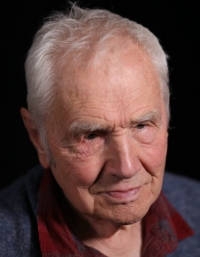Prof. Ing., CSc. Jiří Kryštůfek
* 1933
-
"The Russians were very well received and enthusiastically welcomed. Unfortunately, there were some excesses with wild soldiers, which were caused under the influence of alcohol, vodka was ubiquitous. It was excused by the fact those were just soldiers. That was in the first weeks, when no one knew the political side of the matter. The later perspective, the fact, that they brought us another sort of dictatorship. At that time, no one perceived that they were imposing totalitarianism. That awareness was totally absent. Maybe just intellectuals who knew USSR or worked there and knew the situation and pre-war tension. But they kept rather silent about it. But at the time of liberation it seemed defamatory. It is surprising how the nation wanted to see the liberators as ideal. Even elderly people had such ideas of Russian heroes, Cossacks on horses coming to free us. When the Cossacks horse drinks from the Vltava, then there will be peace."
-
"Yes, to the direct question, you can't say NO. There was a happy atmosphere at the end of 1967. There was a bunch of eager young Communists who wanted to reform strongly. The development at that time did not indicate the weakness of the USSR. It was necesary to follow a certain development trend similar to Yugoslavia. They took me to the party and it was not even a year. He never had any funcion. The Prague Spring took place, which I attended vividly but not in office, and the department I worked on received the label of counter-revolution.”
-
"So the psychological terror was considerable. Parents didn't sleep and signed a voluntary sale. Father was not alone, about 20 other drapers signed too. There was a legal problem, there was no way to find it was forced and could not be reversed. The sum was relatively high, considering that it paid the state-owned enterprise to a private person then identified as a "bourgeois element." This was ensured by the scheme by converting it into tied inputs at banks. One could only have a limited amount of money. If it was one million crowns, he could have handled about 20,000 crowns a year. That was not a big amount. In 1953 during currency reforms the inputs were canceled and forfeited competely."
-
Celé nahrávky
-
Liberec, 23.09.2019
(audio)
délka: 02:18:18
Celé nahrávky jsou k dispozici pouze pro přihlášené uživatele.
At that time no one perceived that our liberators were bringing us just another form of totalitarianism
Jiří Kryštůfek was born on 18 September 1933 in Humpolec. He comes from a poor family. The mother was a seamstress, the father a textile specialist who later owned a small cloth licencing trade. Jiří started school on September 1, 1939. In 1943 he passed the exams at the eight-year grammar school in Humpolec. He recalls the liberation of Humpolec by the Red Army in May 1945. His parents were forced to sell their business under political pressure in 1950. Jiří Kryštůfek had problems with admission to school-leaving exam because he came from a business family. He finally graduated in 1951. By lucky chance he graduated from the University of Chemistry and Technology in Prague and Pardubice in the field of textile chemistry. In 1960 he became a lecturer at the Institute of Mechanical and Textile Engineering in Liberec. He worked at the Department of Textile Chemistry. In 1970 he was dismissed from college because of his attitude during 1968. He had a hard time finding a job in his field. Finally, he found employment at the State Textile Research Institute in Liberec. He returned to his former department in 1990. He finally had the opportunity to defend his candidate thesis, then habilitated as associate professor and was appointed a university professor. He lives in Liberec and published a memorial book about his childhood and youth in Humpolec.
